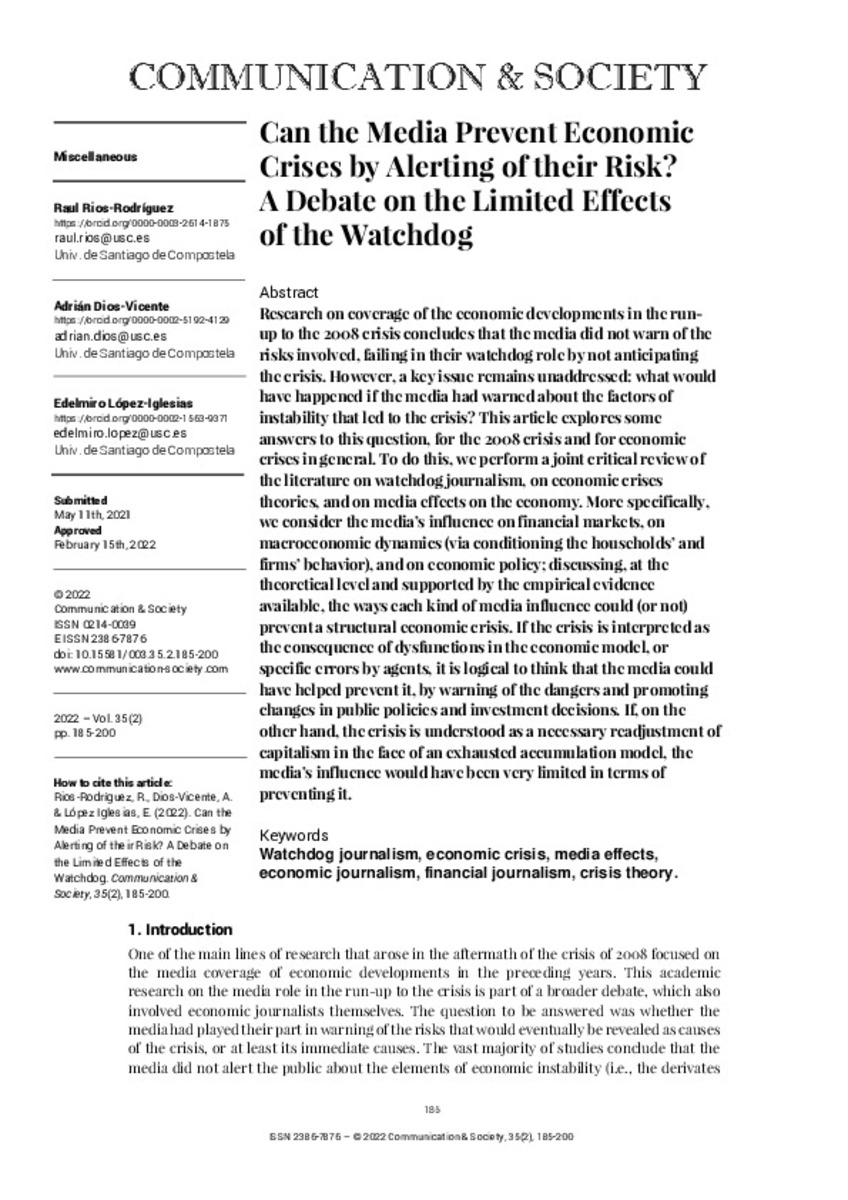Full metadata record
| DC Field | Value | Language |
|---|---|---|
| dc.creator | Rios-Rodríguez, R. (Raul) | - |
| dc.creator | Dios-Vicente, A. (Adrián) | - |
| dc.creator | López-Iglesias, E. (Edelmiro) | - |
| dc.date.accessioned | 2022-04-01 | - |
| dc.date.accessioned | 2022-05-19T06:19:49Z | - |
| dc.date.available | 2022-05-19T06:19:49Z | - |
| dc.date.issued | 2022 | - |
| dc.identifier.citation | Rios-Rodríguez, R. (Raul); Dios-Vicente, A. (Adrián); López-Iglesias, E. (Edelmiro). "Can the Media Prevent Economic Crises by Alerting of their Risk? A Debate on the Limited Effects of the Watchdog". Communication & Society. 35 (2), 2022, 185 - 200 | es |
| dc.identifier.issn | 2386-7876 | - |
| dc.identifier.uri | https://hdl.handle.net/10171/63456 | - |
| dc.description.abstract | Research on coverage of the economic developments in the run-up to the 2008 crisis concludes that the media did not warn of the risks involved, failing in their watchdog role by not anticipating the crisis. However, a key issue remains unaddressed: what would have happened if the media had warned about the factors of instability that led to the crisis? This article explores some answers to this question, for the 2008 crisis and for economic crises in general. To do this, we perform a joint critical review of the literature on watchdog journalism, on economic crises theories, and on media effects on the economy. More specifically, we consider the media’s influence on financial markets, on macroeconomic dynamics (via conditioning the households’ and firms’ behavior), and on economic policy; discussing, at the theoretical level and supported by the empirical evidence available, the ways each kind of media influence could (or not) prevent a structural economic crisis. If the crisis is interpreted as the consequence of dysfunctions in the economic model, or specific errors by agents, it is logical to think that the media could have helped prevent it, by warning of the dangers and promoting changes in public policies and investment decisions. If, on the other hand, the crisis is understood as a necessary readjustment of capitalism in the face of an exhausted accumulation model, the media’s influence would have been very limited in terms of preventing it. | en_US |
| dc.language.iso | eng | - |
| dc.publisher | Servicio de Publicaciones de la Universidad de Navarra | es_ES |
| dc.rights | info:eu-repo/semantics/openAccess | es_ES |
| dc.title | Can the Media Prevent Economic Crises by Alerting of their Risk? A Debate on the Limited Effects of the Watchdog | en_US |
| dc.type | info:eu-repo/semantics/article | es_ES |
| dc.identifier.doi | 10.15581/003.35.2.185-200 | - |
| dadun.citation.endingPage | 200 | - |
| dadun.citation.number | 2 | - |
| dadun.citation.publicationName | Communication & Society | - |
| dadun.citation.startingPage | 185 | - |
| dadun.citation.volume | 35 | - |
Files in This Item:
Statistics and impact
Items in Dadun are protected by copyright, with all rights reserved, unless otherwise indicated.






